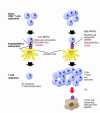Immune recognition of self in immunity against cancer
- PMID: 15314682
- PMCID: PMC503781
- DOI: 10.1172/JCI22685
Immune recognition of self in immunity against cancer
Abstract
Most antigens expressed by human cancer cells and recognized by host T cells and antibodies are nonmutated self antigens — molecules also expressed on the surface of normal cells. These self antigens are ineffective at triggering immune responses against cancer cells, which provides one explanation for the difficulties in trying to immunize against human cancer. A new study describes how tumors can avoid recognition by the immune system and how enhancing the affinity of the interaction between a self antigen and the MHC-I molecule may lead to cancer immunity.
Figures

Comment on
-
Poor immunogenicity of a self/tumor antigen derives from peptide-MHC-I instability and is independent of tolerance.J Clin Invest. 2004 Aug;114(4):551-9. doi: 10.1172/JCI21695. J Clin Invest. 2004. PMID: 15314692 Free PMC article.
References
-
- Burnet FM. Immunological recognition of self. Science. 1961;133:307–311. - PubMed
-
- Houghton AN, Gold JS, Blachere NE. Immunity against cancer: lessons learned from melanoma. Curr. Opin. Immunol. 2001;13:134–140. - PubMed
-
- Hahn WC, Weinberg RA. Rules for making human tumor cells. N. Engl. J. Med. 2002;347:1593–1603. - PubMed
-
- Land H, Parada LF, Weinberg RA. Tumorigenic conversion of primary embryo fibroblasts requires at least two cooperating oncogenes. Nature. 1983;304:596–602. - PubMed
-
- Prehn RT, Main JM. Immunity to methylcholanthrene-induced sarcomas. J. Natl. Cancer Inst. 1957;18:769–778. - PubMed
Publication types
MeSH terms
Substances
LinkOut - more resources
Full Text Sources
Other Literature Sources
Research Materials

